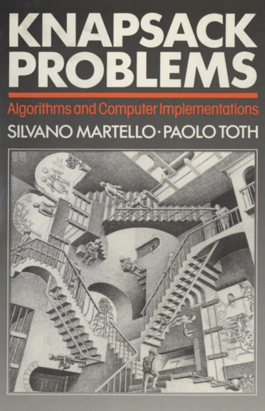Knapsack Problems: Algorithms and Computer Implementations

简介:
本书全面概述了解决背包问题 (KP) 的方法,其变体和概括。通过介绍一系列算法技术,本书也是研究现代算法的合适工具。
这是对整数线性规划领域中许多重要的np-hard问题的精确和近似算法的最新研究,作者将其称为 “背包”。不仅包括经典的背包问题,例如二进制,有界,无界或二进制倍数,还包括不太熟悉的问题,例如子集和和更改。
还涵盖了通常不在背包区域中分类的众所周知的问题,包括广义分配和装箱。本文充分开发了一种算法方法,而又不失数学严谨性。本书从背包问题的基本介绍开始。它继续讨论可用于解决此问题的基本技术,这对于计算机科学,数学和经济学的本科生来说是有用的阅读。总之,可以说这本书是学生的宝贵资源,也是对这个问题感兴趣的研究人员的宝贵资源。
英文简介:
This book provides a comprehensive overview of the methods for solving Knapsack Problems (KP), its variants and generalizations. By presenting a range of algorithmic techniques, this book is also a suitable tool for studying modern algorithms.
Here is a state of art examination on exact and approximate algorithms for a number of important NP-hard problems in the field of integer linear programming, which the authors refer to as 'knapsack'. Includes not only the classical knapsack problems such as binary, bounded, unbounded or binary multiple, but also less familiar problems such as subset-sum and change-making.
Well known problems that are not usually classified in the knapsack area, including generalized assignment and bin packing, are also covered. The text fully develops an algorithmic approach without losing mathematical rigor.
The book starts with a basic introduction to the knapsack problem. It proceeds with a discussion about the basic techniques available for the solution to this problem, which makes it useful reading for undergraduate students of computer science, mathematics and economics. In conclusion, it could be said that the book is a valuable source for students, but also for researchers interested in this problem.
- 书名
- Knapsack Problems: Algorithms and Computer Implementations
- 译名
- 背包问题:算法和计算机实现
- 语言
- 英语
- 年份
- 1990
- 页数
- 306页
- 大小
- 22.49 MB
- 标签
- 算法
- 下载
 Knapsack Problems: Algorithms and Computer Implementations.pdf
Knapsack Problems: Algorithms and Computer Implementations.pdf- 密码
- 65536
最后更新:2025-04-12 23:57:36
←The Implementation of Functional Programming Languages
→The Sound of Innovation: Stanford and the Computer Music Revolution